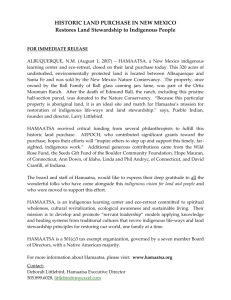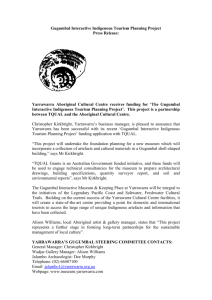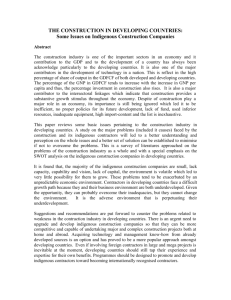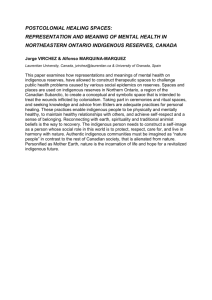Glossary Adoption Alienation Apartheid Assimilation Breach British
advertisement
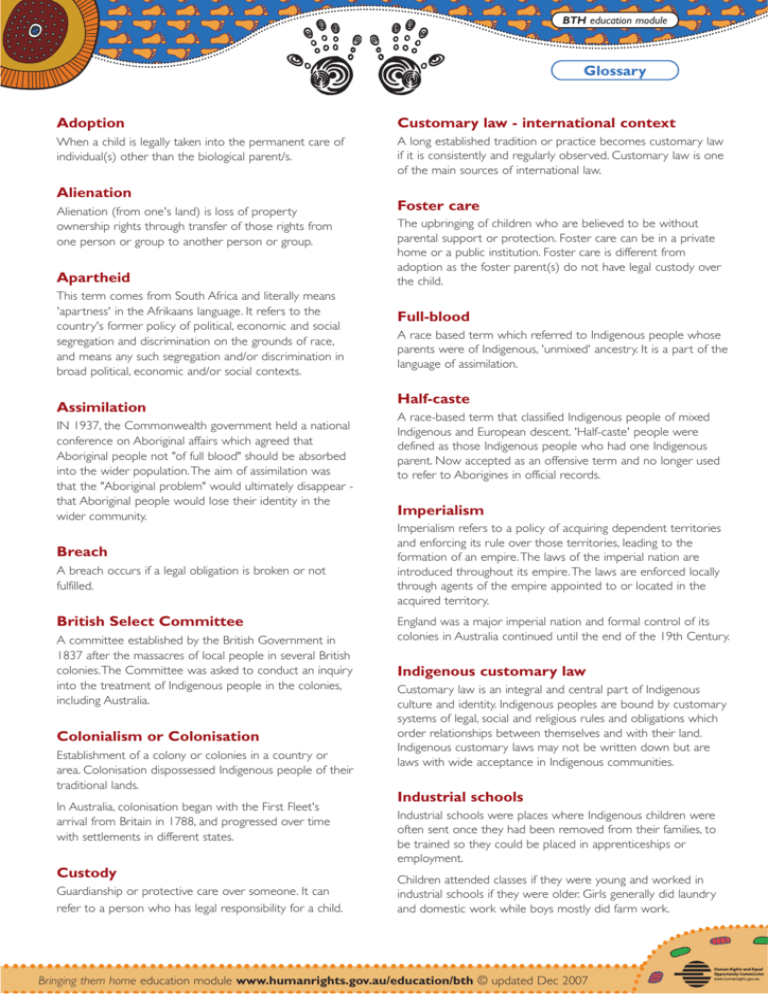
BTH education module Glossary Adoption Customary law - international context When a child is legally taken into the permanent care of individual(s) other than the biological parent/s. A long established tradition or practice becomes customary law if it is consistently and regularly observed. Customary law is one of the main sources of international law. Alienation Alienation (from one's land) is loss of property ownership rights through transfer of those rights from one person or group to another person or group. Apartheid This term comes from South Africa and literally means 'apartness' in the Afrikaans language. It refers to the country's former policy of political, economic and social segregation and discrimination on the grounds of race, and means any such segregation and/or discrimination in broad political, economic and/or social contexts. Assimilation IN 1937, the Commonwealth government held a national conference on Aboriginal affairs which agreed that Aboriginal people not "of full blood" should be absorbed into the wider population.The aim of assimilation was that the "Aboriginal problem" would ultimately disappear that Aboriginal people would lose their identity in the wider community. Breach A breach occurs if a legal obligation is broken or not fulfilled. British Select Committee A committee established by the British Government in 1837 after the massacres of local people in several British colonies.The Committee was asked to conduct an inquiry into the treatment of Indigenous people in the colonies, including Australia. Colonialism or Colonisation Establishment of a colony or colonies in a country or area. Colonisation dispossessed Indigenous people of their traditional lands. In Australia, colonisation began with the First Fleet's arrival from Britain in 1788, and progressed over time with settlements in different states. Custody Guardianship or protective care over someone. It can refer to a person who has legal responsibility for a child. Foster care The upbringing of children who are believed to be without parental support or protection. Foster care can be in a private home or a public institution. Foster care is different from adoption as the foster parent(s) do not have legal custody over the child. Full-blood A race based term which referred to Indigenous people whose parents were of Indigenous, 'unmixed' ancestry. It is a part of the language of assimilation. Half-caste A race-based term that classified Indigenous people of mixed Indigenous and European descent. 'Half-caste' people were defined as those Indigenous people who had one Indigenous parent. Now accepted as an offensive term and no longer used to refer to Aborigines in official records. Imperialism Imperialism refers to a policy of acquiring dependent territories and enforcing its rule over those territories, leading to the formation of an empire.The laws of the imperial nation are introduced throughout its empire.The laws are enforced locally through agents of the empire appointed to or located in the acquired territory. England was a major imperial nation and formal control of its colonies in Australia continued until the end of the 19th Century. Indigenous customary law Customary law is an integral and central part of Indigenous culture and identity. Indigenous peoples are bound by customary systems of legal, social and religious rules and obligations which order relationships between themselves and with their land. Indigenous customary laws may not be written down but are laws with wide acceptance in Indigenous communities. Industrial schools Industrial schools were places where Indigenous children were often sent once they had been removed from their families, to be trained so they could be placed in apprenticeships or employment. Children attended classes if they were young and worked in industrial schools if they were older. Girls generally did laundry and domestic work while boys mostly did farm work. Bringing them home education module www.humanrights.gov.au/education/bth © updated Dec 2007 BTH education module Glossary Legal guardian Protectionism When a person, is not capable of managing themselves independently, they are cared for by a guardian (according to the law). A guardian can be a parent, or someone appointed by the courts.The guardian has custody of the person, and makes decisions on their behalf. This involved a range of practices and beliefs about how Indigenous people should be 'managed' by governments and their institutions from the 1850s to the mid 1900s. At various times the Chief Protectors of Aborigines were the legal guardians of Indigenous children in Australia. Different State and Territory laws established protection boards and native affairs departments which managed the protection/segregation of a considerable number of Indigenous people. Mandatory sentencing Protectors Mandatory sentencing laws were introduced in Western Australia and the Northern Territory in 1996 and 1997 respectively.These laws require courts to impose minimum sentences of detention or imprisonment for people convicted of certain offences, removing discretion for sentencing from the courts. The Protectors in each state administered government protection policies.They had wide ranging powers, including giving permission to marry, control over movements to and from reserves, social contact between Indigenous people and the removal of Indigenous children from their families. Martial law This refers to law that operates under military rule. It can refer to military control over all civilian activities in a declared war zone. It can also refer to a situation where a country's existing laws are suspended and a military government takes control. Mission A term loosely used to refer to reserves, government stations and Christian institutions where Aborigines were placed. Many of the "missions" were established and run by missionaries and were used to restrict the movements of Aborigines. In most states, missions were regulated by State Governments after Aborigines Protection Boards were set up. Mixed-descent A term that was used to describe people who have both Indigenous and non-Indigenous ancestry. Native title Native title is the recognition in Australian law that Indigenous people had a system of law and ownership of their lands before European settlement. It was first recognised in common law in the Mabo case (1992) by the High Court, which overturned the idea of terra nullius (that the continent belonged to no-one at the time of European arrival).The native title of a particular group depends on the law and customs of those people. Quadroon A race based term that was used to classify Indigenous people of mixed descent. It referred to children who had a 'full-blood' Indigenous person as one of their four grandparents.They were described as being 'one-quarter Aboriginal'. Reconciliation process The decade-long process, which began in 1991 when the federal Parliament created the Council for Aboriginal Reconciliation.The process aimed to increase understanding of Indigenous history, cultures, past dispossession and present disadvantage in the lead-up to the Centenary of Federation, 2001). The 25-member council included 12 Aboriginal people, two Torres Strait islanders and 11 other Australians.The Council presented its report in December 2000.The Report, Australia's challenge put forward a range of recommendations to government to address the 'unfinished business' of reconciliation. At the completion of the ten years, and after delivery of its report, the Council was replaced by Reconciliation Australia, a foundation established to continue the Council's work. Regulations The legal rules by which a policy is carried out. Regulations can be changed, for example through a change in parliamentary legislation. Octoroon Reparations A race based term used to classify Indigenous people of mixed descent. According to this logic, an 'octoroon' has seven white great-grandparents out of eight.They are described as being one-eighth Indigenous. The process of making amends and compensating for wrongs which have been done. According to international legal principles, known as the van Boven principles, reparation has five parts: Bringing them home education module www.humanrights.gov.au/education/bth © updated Dec 2007 BTH education module Glossary [ acknowledgment and apology; [ guarantees that these human rights won't be breached again; [ returning what has been lost as much as possible (known as restitution); [ rehabilitation; and [ monetary compensation. Royal Commission A person or group of people who are appointed by government to investigate an issue that is of major concern to the general public. A Royal Commission has specific and wide-ranging powers and well-defined terms of reference which determine the extent of its investigation. A Royal Commission can compel witnesses to give evidence. It reports to parliament on its findings and makes recommendations. Stolen generations The term "stolen generations" was coined by the Canberrabased historian Peter Read.Through his research Read became aware of the large number of Indigenous children removed from their familles and communities through much of the twentieth century, many in ways which could only be described as stolen or kidnapped. Upon the release of the National Inquiry Report the media coined the term to describe the Indigenous people and others who told their stories to the Inquiry. The Report does not use this term but rather uses "forcible removal policies" to identify the authority under which children were removed illegally or through "compulsion, duress or undue influence". Terms of reference Terms of reference is a set of key statements or questions which outline the scope of a formal inquiry or investigation and indicate what the inquiry is required to investigate and report upon. Terra nullius Segregation The policy and practice of separating Indigenous peoples from non-Indigenous peoples.This was usually brought about by the creation of reserves and missions for the exclusive use of Indigenous people. Segregation has been associated historically with protectionism. Self-determination Self-determination is the right of all people to "freely determine their political status and freely pursue their economic, social and cultural development" (article 1 on the International Covenant on Civil and Political Rights). Self-management This is a Latin term meaning 'not inhabited' or 'empty land'. It is a term which became important during the period of intense colonisation in the 19th century. Under old international law, a new colony could be formed if: [ a treaty was made with the original inhabitants (New Zealand) [ [ the land was gained through conquest (Canada) there were no inhabitants (Australia) In 1992 the Australian High Court recognised that Indigenous native title rights had survived the British colonisation of Australia. The recognition of Indigenous people's right to manage their own affairs with sufficient control over land and natural resources to preserve the cultures of Indigenous groups. Title Separatism Treaty A system where different laws and regulations apply for different racial groups. In Australia's context Indigenous people have had a different set of laws applied to them from those applied to non-Indigenous people. A treaty is a formal agreement between two or more parties who seek to have their relationship with each other clearly defined. The legal right to ownership of property. Reference list State Ward A child who is declared to be under the care of the State (government). A court order can declare that a child is to be made a ward of the state. [ [ [ http://www.macquariedictionary.com.au http://www.nntt.gov.au/ http://www.reconciliation.org.au Bringing them home education module www.humanrights.gov.au/education/bth © updated Dec 2007



